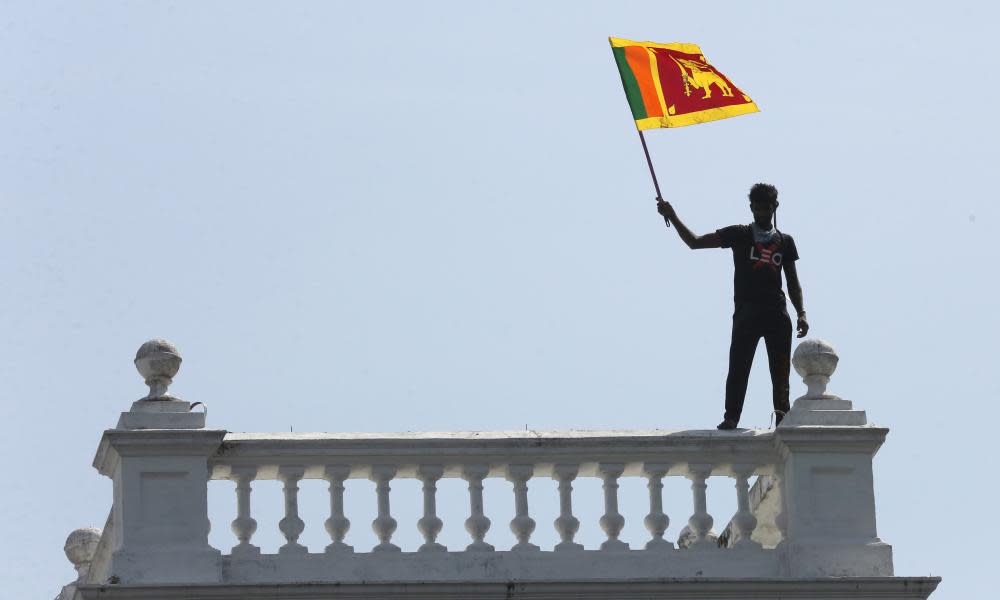Sri Lanka’s old political order has collapsed. What happens next?

The images coming from Sri Lanka are extraordinary: protesters are wrestling on the president’s bed, cooking on his sprawling lawns and swimming in his pool. This public outrage is all aimed squarely at President Gotabaya Rajapaksa, whose administration has left Sri Lanka begging for a cash bailout from the International Monetary Fund after defaulting on foreign debt for the first time since it became independent from British colonial rule in 1948.
Rajapaksa fled the country on Tuesday, and the prime minister, Ranil Wickremesinghe, has declared a state of emergency. Thousands of protesters remain in the streets and occupy several government offices, demanding that both leaders step down. Speculation is rife as to whether Rajapaksa is planning a military coup or an aggressive crackdown on the peaceful protesters. He faces war crimes allegations in addition to charges of presiding over gross economic and political mismanagement, which ultimately bankrupted the country of 22 million people.
There is a big question mark over what happens next in Sri Lanka. Discussions on who would succeed the president are afoot, with the Speaker of parliament being considered the likely candidate. There is no doubt that a democratically elected political leadership is needed to restore some stability, but before that happens, the opposition needs to secure an agreement between parliamentary parties for a transitional plan.
The first step in such a plan would be the appointment of a president for a limited time frame, which could in turn herald a process to abolish the executive presidency, which would then be followed by dissolution of parliament. At every step the opposition needs to ensure accountability to law and to the Sri Lankan people. At the time of writing, the main opposition party, Samagi Jana Balawegaya (SJB, or United People’s Power), which has 50 seats in the 225-member house, was making desperate attempts to bring other parties into a consensus agreement.
There will be no easy solutions to mend the broken economy and heal a country that has for more than four decades lived the multiple traumas of conflict, natural disasters and economic collapse. With poverty deepening, whoever takes over control of the government will need to put in effect immediate solutions, such as cash transfers for poor people, to address the burning issues the country is facing. Neighbours such as India have already signalled that their help will be limited, and an IMF bailout will come with strings attached. Ultimately Sri Lanka will need to put in place a system of good fiscal governance and anti-corruption measures to win back international credibility and trust.
The Sri Lanka experience will go down in history as one where leaders made poor decisions with a complete lack of accountability, and found themselves in a crisis accelerated by the conflict in Europe and global supply issues. This led the country into an irreversible downward spiral. President Rajapaksa and his coterie made bad decisions and suppressed any democratic questioning of these policies, which compounded the country’s dire economic situation and triggered food, energy and humanitarian crises.
On the positive side, Sri Lanka offers the spectacular narrative of a nation that has come together in mass protest and peacefully achieved what an electoral process could not. If Rajapaksa resigns in exile, then this spells the end of a powerful and abusive political dynasty that ruled Sri Lanka for almost two decades.
This stripping of power has been virtually a bloodless revolution. It could be a lesson for other countries where people power could spur such positive change. Sri Lanka is quite unique in its location, history and the experiences of its people. There are many existing fault lines in the way ethnicity and religion intersect and a majoritarian Sinhala Buddhist nationalism has taken root. Yet these fault lines have blurred and people have organised over social media to protest in a manner not seen before. Where Sri Lanka goes next is not clear yet, but right now this is something that needs to be applauded.
Charu Lata Hogg is an associate fellow with the Asia Pacific Programme at Chatham House

 Yahoo Movies
Yahoo Movies 
